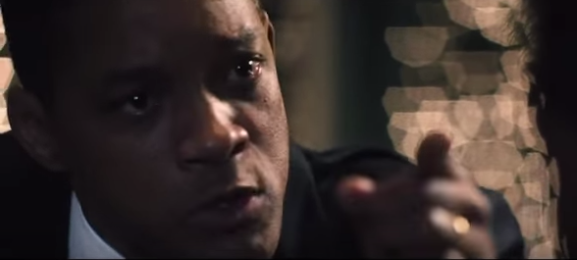A couple years ago, I watched League of Denial: The NFL’s Concussion Crisis on PBS’ FRONTLINE series, along with a lot of other people. I couldn’t believe some of the things I was hearing and seeing, but fast forward two years later, and we’re more educated as a society of the dangers playing football at any level can bring. Will Smith’s new movie Concussion is set to be released in December, and it won’t let the NFL just sweep their problems under the rug.
Smith plays Dr. Bennet Omalu, the neuropathologist that studied Mike Webster’s brain in-depth and whose words of warning to the NFL fell on deaf ears. The trailer is very good, but it ultimately breeds some resentment, at least in myself, that the NFL shunned Omalu the way they did when the statistics were right in front of them.
You better believe the NFL won’t like this very much.
https://www.youtube.com/watch?v=Qk-1TLVUPZk
Heavy stuff. During this morning’s MMQB on SI.com, Peter King published an interview he had with the film’s writer and director, Peter Landesman.
MMQB: Why did you make this movie?
Landesman: I gravitate towards stories of David versus Goliath, the small man versus the machine. Whether it is Bennet Omalu or Gary Webb, a reporter who discovered the cocaine trafficking with the CIA and was destroyed by the Washington Post and the CIA and others. In my writing career as a journalist, it was little man against the machine so I think I am just hard-wired for that narrative. When I heard about Bennet Omalu, I recognized that the story operated on a number of levels that made it completely unique. As an immigrant coming to America, who discovers a dangerous detail about the most American of things, America’s sacred cow, who then is forced to tell America about itself as a disaffected Nigerian, it was an extraordinary opportunity to explore what it is to be an American. And it was a gorgeous way to understand what it is to be a citizen of this nation. And then there was the sports element. I played football for two years in college, I love the game, I am an athlete, I love sports and I watch football. I went to Brown, the powerhouse. I thought this was another way to un-peel the layers away from the theater of it and the pageantry of it to get to the humanity of it.
MMQB: In seeing all the scenes of Pittsburgh in the film, a city that just loves football as much as any city in America, I thought, “Maybe it took a person not from America to examine this. Maybe no one else would have looked at Mike Webster’s brain.”
Landesman: It’s the dynamic of, ‘Respect the person or respect the truth.’ Bennett has a savant-like relationship to the dead. His obsession is to tell the story of death. As he says in the movie, I think more about the way people die and reasons they die than the way they live. He was completely focused on the science. He didn’t know football, he didn’t know who Mike Webster was; to him, Webster was just another body on a slab. He didn’t have a reverence for the game because he wasn’t brought up in this country. So in some ways, his purity and his innocence was a requirement for him to drill down into this and tell us a very uncomfortable and inconvenient truth.
MMQB: Do you think people should love football? Should there be football?
Landesman: I have no position on whether or not people should play football or whether they should have their kids play football. To me, this is a story about making adult choices. Once you have the information—and the information has been obscured for a long time, it’s been buried and covered up by people who don’t want to damage the sport—the information is now out there, and I hope this movie brings together the information in a way that the general public can metabolize and now make their own decisions. So now that you know that concussions can kill you and playing the sport can kill you, it’s on every parent and it’s on every college player, it’s on every high school player and professional player on whether you are going to let your child play. It’s the same with smoking, drinking and doing drugs. I like to think in some ways that life is an occupational hazard. Something we do in our life is going to kill us; maybe now, maybe 50 years from now. You have to choose what those things are. We love to drink and be merry and be happy, we know it’s not good for us, but we do it. It’s about making adult choices.
MMQB: Are you sure you’re not making this movie to drive people away from football?
Landesman: I was very focused on this story. I don’t feel responsible or connected to the consequences. Storytellers can’t be. Otherwise you get hamstrung by your own conscience. You just have to tell the truth with the most integrity that you can.
MMQB: What was your reaction to Chris Borland’s early retirement? And Borland screened the movie. How was that?
Landesman: I had a feeling of tremendous sobriety. I understood the heaviness of his decision to walk away from the money and the fame and the joy and the camaraderie. But there’s a high school team in Texas that just closed its doors. There are colleges that are considering closing their programs. I did reach out to Chris because I wanted him to know that he’s not alone, and I wanted him to understand his own decision in a way he might not be able to yet. So we brought him down to Los Angeles, and at the end of it, he was literally, physically shaking. Shaken and shaking. I think that he wasn’t able to really understand the physical consequences of his own decision yet.

